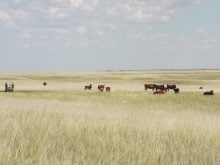It’s a well described phenomenon. If we randomly ask a group of people to rate their driving skills, the majority will rate themselves as above average. Of course, this can’t be true. Some of us are just average drivers and some of us are somewhere below the average. Psychologists describe this cognitive bias as “illusory superiority.” In other words, we often tend to overrate our own abilities.
I expect if we asked a group of beef cattle producers or stock people to rate their animal handling skills we might see the same phenomenon. Most of us would probably describe ourselves as above average in our stockmanship skills. However, I expect the same concept of illusory superiority is at play here. Many of us are over-rating our abilities and we could all benefit from some actual training on this important skill.
Read Also

Beef check-off collection system aligns across the country
A single and aligned check-off collection system based on where producers live makes the system equal said Chad Ross, Saskatchewan Cattle Association chair.
We have seen more workshops on low stress handling become available to western Canadian beef producers to attend and I know that everyone that enrolls in one of these workshops comes away with a new appreciation for some of the more subtle aspects of animal handling. Many of the participants are eager to attend another workshop should they have the opportunity in the future.
However, we probably have a large unreached population of cattle producers and farm employees who have not had the opportunity to have formal training in animal handling. They may think that they are “above average” at animal handling, but many would benefit from a comprehensive training program.
A recent study in the Livestock Science journal demonstrated the benefits of training programs on Brazilian beef farms. The authors of the study followed 150 farm workers from 24 different beef operations in Brazil. They divided the farms into three categories: farms that had regular animal handling training programs (nine), farms with occasional training (nine), and farms with no training programs (six). The 150 farm workers were categorized as those who attend formal training programs (43), those who didn’t attend but who had close contact with a worker who had been trained (62), and those who did not attend a training program and did not have contact with any workers who had been trained (45). The researchers then went to each farm on an important animal handling day when the herds were being vaccinated. They observed the handling of each worker and scored their animal handling skills and attitudes.
It was clearly apparent that attending a training course made a big difference in attitudes and behaviours. Non-trained employees had the worst scores when it came to animal handling and it was also reflected in the behaviour of the animals they worked with. The cattle that interacted with the non-trained employees demonstrated more undesirable behaviours such as jumping, lying down, balking, and aggression. They also demonstrated a higher percentage of vaccination injection “failures” (where vaccine was improperly administered) within the cattle vaccinated by the non-trained group.
In addition, they had each employee fill out a short survey about attitudes toward cattle, and the researchers were able to show that the trained employees had better attitudes about animal welfare compared to the other two groups of employees.
One key finding of the study was that on the farms where no formal training occurred, the researchers documented a deterioration in animal handling skills occurring over time. That is, as the day went on and workers got more tired, their animal handling skills got worse as well. Again, it is important to recognize that this trend did not occur on the farms where formal training had been instituted.
There is probably a need for more formalized low-stress animal handling courses than we have available to us at present. The people we currently have giving these in Western Canada are absolutely great instructors and if you have the opportunity to attend one of these workshops, please make sure you make the effort. You won’t regret it.
However, it may not be possible for everyone to make it to one of these workshops. If you can’t attend one, there are some good online resources that may be of some help, although practical in-person training would probably be preferable. If you have employees on your operation, don’t assume that everyone who comes from an agricultural background knows how to handle cattle. This study shows that there are some major benefits to employees and cattle in providing some form of training on the basic principles of low stress animal handling. These employees demonstrated better attitudes and continued to do a good job throughout the day.
A good practice that I’ve seen some farm managers adopt is to have a short “huddle meeting” before any animal handling event to briefly talk about what needs to happen that day and to remind family members and employees about important human safety and animal handling procedures. It doesn’t need to take long and it reminds everyone about some of the important principles on animal handling just before the event occurs. This study would suggest that formalized animal handling training helps everyone become “above average” in terms of animal welfare.
John Campbell is a professor in the department of Large Animal Clinical Sciences at the University of Saskatchewan’s Western College of Veterinary Medicine.

















